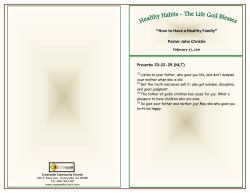
Name ______________________________
Name ______________________________ Sayings We Share: Proverbs and Fables Compiled By Norma Tong Lee Illustrated by Krystyna Stasiak Prediction ____________________________________________ ____________________________________________ ____________________________________________ ____________________________________________ ____________________________________________ ____________________________________________ Author’s Purpose inform persuade entertain Sayings We Share Focus Skills: •To identify the problem/conflict and its resolution in a story •To read and understand proverbs and fables •To use object pronouns correctly Genre Fables- short stories that teach a lesson Proverbs- sayings that give advice or teach a lesson Summary The sayings and fables in this selection represent oral traditions from Vietnam, Africa, ancient Greece, the United States and elsewhere. The wisdom found in this literature has survived generations, contributing to the growth and survival of cultures all over the world. Similar messages are found throughout despite their place of origination. Reading Strategy Make and Confirm Predictions Good readers use story clues and what they know to make predictions. Then they read on to see if their predictions are correct. Page Compare and contrast the first pair of proverbs. 392 Working persistently, ants can fill the nest with food. One beaver can fell a hundred trees. What pair of sayings have the same message as the saying, “Choose your friends wisely”? Why do proverbs talk about ants and beavers instead of just saying “If you work long and hard you will get a lot done”? Page 394 Which Vietnamese proverb on pages 392-393 has almost the same message as “He who lies down with dogs shall rise up with fleas”? Which two proverbs have almost the same meaning as the proverb “Never put off till tomorrow what you can do today? What is the meaning of “A penny saved is a penny earned”? Choose a proverb from this selection and tell how someone might use its wisdom. Page What advice would you give to the hare if he has to run another race? 396 What is one situation in real life that is like the one in the story. Page 398 How do the animals act when the rooster crows loud enough to bring the sun up? Why isn’t the rooster sad about the farm animals’ complaining? Page 400 What message is the author trying to get across? Page 402 Give an example of how you could use this moral in your life. Think and Respond 1. How are the proverbs and fables in this selection alike? ________________________________________________________ ________________________________________________________ ________________________________________________________ 2. Why is it important to read the headings and titles on these pages? ________________________________________________________ ________________________________________________________ ________________________________________________________ 3. Which of the proverbs or fables do you think teaches the most important lesson. Explain ________________________________________________________ ________________________________________________________ ________________________________________________________ 4. Say this moral in your own words: Working persistently, ants can fill the nest with food. ________________________________________________________ ________________________________________________________ ________________________________________________________ ________________________________________________________ Use the graphic organizer to answer the following questions. 1. According to this selection, who do you learn much about life from? 2. What is another name for common sayings? 3. What are oral traditions? 4. Proverbs from around the world may use different words. What is the same about these proverbs? 5. What is the American saying that is similar to the Vietnamese proverb Even with two hands, one cannot catch two fish at one time. 6. What is the moral of a story? 7. What does the rooster teach us? 8. What does the proverb He who lays down with dogs shall rise up with fleas mean? 9. Why does the lazy mouse go hungry? 10. What fable is “slow and steady wins the race” the moral for? 11. When were Aesop’s fables written? 12. What type of story is this selection most like? 13. How are fables and proverbs alike? 14. How are the dog and the wolf in the French fable different?
© Copyright 2025


















